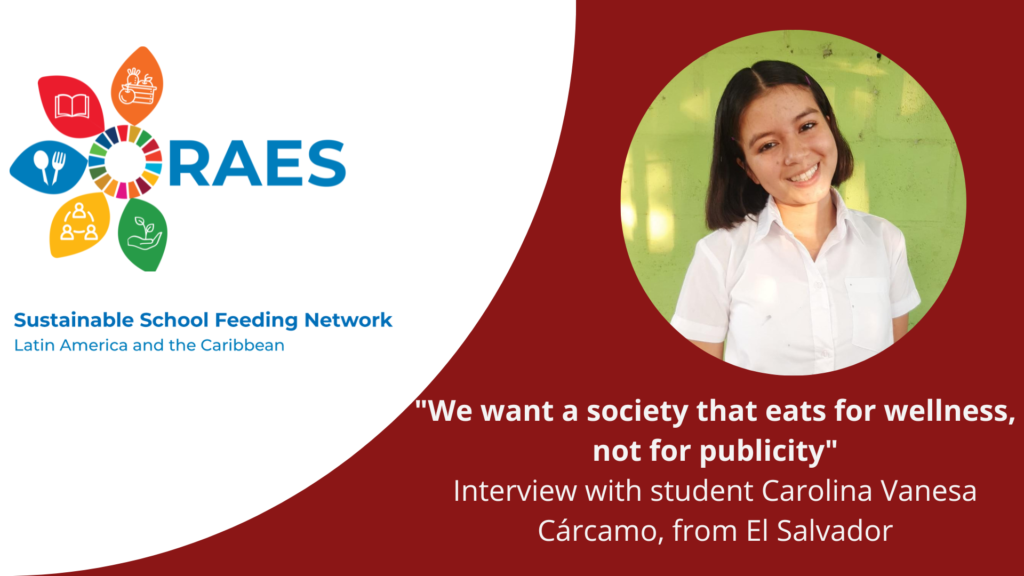Carolina Vanesa Cárcamo, a student from El Salvador, recalls her experience with food and nutrition education
Paulo Beraldo
The student Carolina Vanesa Carcamo, from Izalco, El Salvador, is clear about the role of food and nutritional education in her life and in the lives of her classmates. In an interview for the Sustainable School Food Network (RAES, for its Spanish acronym), Carolina sends a strong message to the managers of the school food policy: “Many of our communities need better education, they need practical food and nutrition education bases and that lead the new generations to a healthier lifestyle,” she says.
“It is in their hands to give better welfare to the population. To invest more in education so that we can have a different society than the one we currently have, which dresses and eats for publicity, not for well-being,” states the 17-year-old student from the Educational Complex San Isidro County. “Health and nutrition are fundamental in society, as is education”.

Carolina was part of a project that selected several students to become ambassadors of healthy eating habits, as part of the “Young facilitators in food and nutrition security” initiative, developed with the support of FAO in El Salvador and the Brazil-FAO International Cooperation. The goal of the project was to train students to spread the message of healthy eating among the school’s 1 500 students.
“It is an excellent opportunity to train the new generations. We are used to eating street food, what we call junk food, with no benefits to our health. It may be because we ignore the issue of healthy eating, because these foods look attractive or because they are everywhere in the society,” explains Carolina.
“I think we can influence new generations. We can let them know the benefits of consuming healthy and nutritious products. And they can choose healthier eating practices so that there is no risk of disease due to junk food consumption. We learned a lot about the benefits and properties of food, and we learned delicious and healthy recipes that could be attractive to students. So, it is a fundamental subject since it is knowledge for life and it is very useful for us. When something was taught about junk food, which was bad for our health, many times I thought: really? I was quite surprised”.
In the process, the school garden became a living classroom for hands-on learning, capturing the attention of students, parents, and teachers. “It is an activity that teaches us different points of view. With the garden we can learn to produce our own food, and value and respect nature. Our teachers used the garden to put into practice different subjects and everything ended up with educational purposes “.
“Being in the project has been to my complete appreciation. I grew up here, I had great experiences, I spent time with older classmates, from other grades, and the training had always a very cool atmosphere.”
During the pandemic, Carolina emphasizes that, with the rising of food prices, products such as vegetables that she grew with her family at home were very beneficial. “We had the opportunity to harvest in our own home. Previously, I didn’t like some vegetables but now I do eat them all.”
Today, the San Isidro County school canteen serves healthy and nutritious meals made with local produce, such as vegetables and fruits, to all students from 4 to 18 years of age. Some of the ingredients come from the school garden, which the students care for and harvest, which is very relevant in a country where 30.7% of first graders are overweight or obese, according to the IV Height Census and I National Weight Census.
“I want to comply with the Sustainable Development Goals. I believe and have faith that society can change. The world can change, and we can reverse climate change through good actions. This motivates me to continue studying. I will not give up until I achieve these goals. I want to go as high as I can to be able to give my support. I just want to give back what FAO have done for me”.
See the interview with Carolina Vanesa in the video below, available in Spanish



